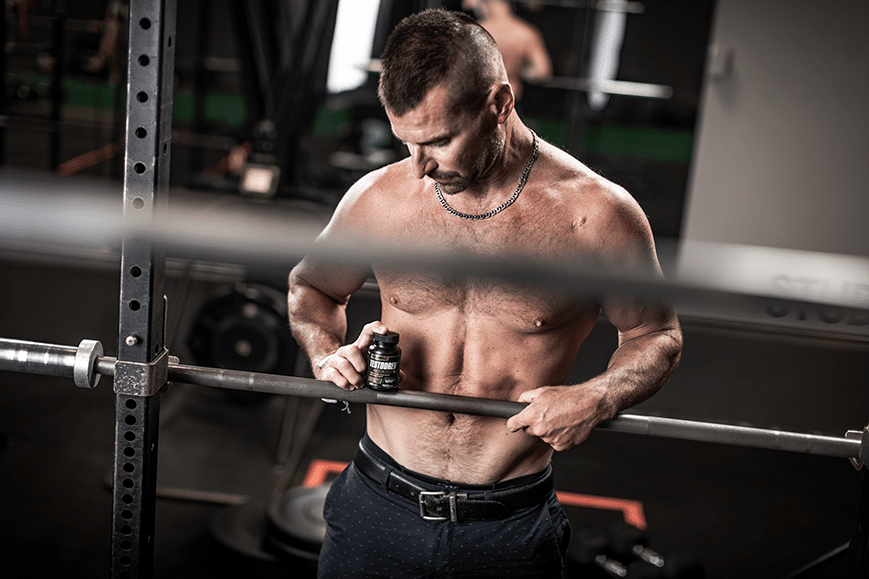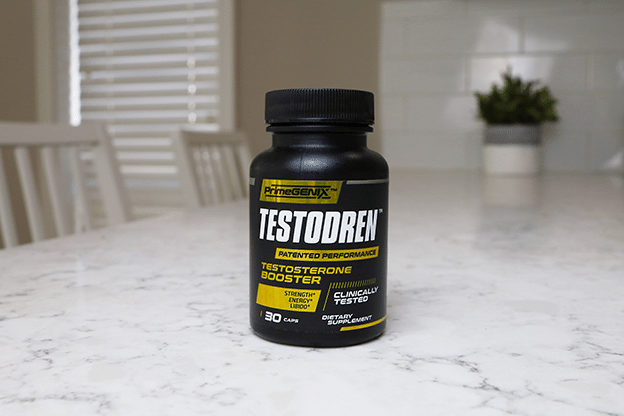As the weather gets warmer there are more and more opportunities to show off the physique you’ve been sculpting all winter. The downside is that our testosterone levels (T-levels) are often at their lowest in summer.
If your T-levels are within the normal range or higher (270 to 1070 ng/dl), this drop may not be noticeable. If you are already suffering from testosterone deficiency, however, summer may signal that it’s time to give your T-levels an extra boost.
Keep reading for some natural testosterone boosting tips for men just in time for summer. First, let’s talk briefly about what testosterone is and why we experience seasonal fluctuations in our T-levels.
What is Testosterone?
Testosterone is an androgen hormone whose primary function is the development of characteristics typically associated with men such as facial hair, deep voice, and muscle growth. While it’s most well-known as the “male sex hormone,” testosterone is present in women as well, just in small quantities.
It’s what controls our sexual function and ultimately what makes us feel like men. T-levels naturally decline as we age, usually about 1% each year after age 30, though younger men may occasionally deal with testosterone deficiency.
There are many reasons aside from aging that cause our testosterone levels to drop. Some are genetic, making it more difficult to address naturally, while others are related to things within our control.
Why T Levels Drop in the Summer
Women aren’t the only ones who experience hormonal cycling. No, you didn’t read that wrong. It’s true. The seasons have a significant (if not surprising) impact on our testosterone levels.
Although our T-levels stay within a certain range (declining as we age), they can fluctuate pretty significantly within a day, week, or year. This is most commonly referred to as seasonal testosterone variation1.
You may have noticed in winter you’re a bit more irritable and frustrated than normal. While most of us might chalk it up to the holidays, the reality is that we’re experiencing a seasonal boost in our testosterone.
Our testosterone levels typically peak in late fall and early winter, while we see them hit a low point around June. Research hasn’t yet found a definitive reason why this happens and there’s still a lot of discussion on whether or not there are clinical implications.
While science continues to pursue this phenomenon, the real question is, What can you do to offset this seasonal decline?

How to Naturally Boost Testosterone in Summertime
We’ve compiled a list of the following nine adjustments you can make to your lifestyle, workouts, and diet that can help you beat declining testosterone levels this summer:
- Minimize vices
- Prioritize sleep
- Get outside
- Shake up your workout regimen
- Tone down your cortisol
- Increase intake of healthy fats
- Eat more nutrient-dense foods
- Identify your nutritional deficiencies
- Supplement with testosterone boosters
Keep reading to learn how these minor changes can make a major difference.
Lifestyle Adjustments
Minimize Vices
Summer means more gatherings and celebrations, which most of the time include libations. Unfortunately, excessive smoking and drinking can contribute to low T levels.
Smoking has been shown to influence the levels of total and free testosterone2. This is most likely because smoking reduces zinc levels. Zinc is a key mineral in the production of testosterone. Combined with a poor diet, a zinc deficiency can lead to low T levels.
Overconsumption of alcohol can negatively affect your hypothalamus and pituitary gland, causing impairments in testosterone release. Even men who don’t suffer from chronic alcoholism can experience similar drops in T levels if they regularly drink excessively3.
Don’t worry, we’re not suggesting you become a monk this summer, not by a long shot. We do suggest lowering your alcohol intake if you typically consume more than 15 drinks per week.
Prioritize Sleep
Sleep is for the weak! Or so we often proclaim. Perhaps this makes you feel more in control knowing you can function pretty well with only a few hours of sleep. Perhaps you’re like me and the allure of the internet regularly keeps you up late.
Whatever the cause, if you’re concerned about your testosterone levels it’s time to make sleep a priority. According to studies, sleep becomes even more important to our T levels as we age. We experience boosts to our testosterone production throughout the day, but testosterone levels are replenished as we sleep, peaking during our REM sleep cycle4.
The best way to increase the length of your REM cycle is to get consistent sleep. Other suggestions include avoiding afternoon naps, limiting caffeine intake throughout the day, and eliminating screen time for at least one hour before bed.

Get Outside
A healthy dose of Vitamin D is what summers are made of – it’s good for our health and our mood. But you may be surprised to learn that soaking up the sun can also be good for our testosterone levels5.
Multiple studies show that vitamin D may increase testosterone production in men. When vitamin D levels are optimal in the body, studies have shown that free and total testosterone levels may also be optimized.
Vitamin D deficiency may not directly cause your T levels to decrease on the
If you’re already planning on catching some rays on the beach or basking in the sun on some deck, your T levels will thank you. If your schedule doesn’t allow for a tropical vacation it’s alright, even as little as a half-hour spent outside each day can help.
Rethink Your Workouts
Shake Up Your Regimen
Spending extra hours in the gym to get that perfect beach bod? You may want to mix it up a little. Overtraining can cause an imbalance in your testosterone and cortisol hormones.
Decreases in your testosterone levels as a result of training too hard can cause you to plateau, which is exactly the opposite of what you want to achieve. In these instances, less is more.
If you’re pushing yourself, trying to fit in early morning workouts you may be unintentionally disrupting your cortisol levels. Cortisol is sometimes called the stress hormone. Starting your day in “stress mode” weakens your other hormone levels.
We recommend taking care of your body by ensuring enough recovery time following workouts, including active recovery days, and changing up your routine.
Changes in routine can be what time of day you train and how frequently you train. Even if you maintain their intensity but shorten the length of your workouts you can significantly impact your hormones.
Tone Down Cortisol
High cortisol reduces your free testosterone levels. Known as the ‘fight or flight’ hormone, cortisol increases when we are stressed. When you focus on keeping your cortisol down, you directly help support your testosterone levels.
Some of the most common stressors that cause our cortisol to increase are lack of sleep, overconsumption of caffeine, poor diet, overtraining without appropriate recovery, and overcommitting.
In addition to what we’ve already mentioned in this post (minimizing vices, prioritizing sleep, and getting enough vitamin D), being more intentional with what you eat can also actively lower your cortisol. Keep reading to learn how you can improve your diet to support hormonal balance.

Examine Your Diet
Increase Healthy Fats
It may seem odd that we’re recommending eating more healthy fats, especially since “fat” is probably the last thing you want to hear in a conversation about summer. You may be shocked to learn that low-fat diets can actually decrease your testosterone levels.
Although you’ve probably seen more than one blog promoting a low-fat diet, what you’ll benefit from the most is getting at least 30% of your calories from healthy fats. Instead of avoiding all fats, you want to incorporate more monounsaturated fats (aka healthy fats) into your diet6.
Monounsaturated fats are found in foods such as:
- Nuts
- Olives
- Eggs
- Seeds (flax and chia)
- Avocados
- Fish
- Fattier cuts of mean
- Olive oil
- Coconut oil
- Fish oil
The goal is to spread your consumption of these foods throughout the day. As you increase your fat intake, your testosterone levels will also increase.
Eat Nutrient-Dense Foods
Some guys looking to bulk up for summer may believe the myth that their diets should be packed with protein shakes, pasta, and eggs by the dozen. But it’s just that – a myth.
Consuming only low-nutrient foods leads to malnutrition and inflammation in our gut. When our gut suffers so does our health, including our hormones. It stands to reason then that when our gut is happy, we’re happy.
The best way to protect your gut, and your testosterone levels, is to eat more nutrient-dense foods. Consider increasing your intake of the following foods to give your T levels a boost:
- Probiotic foods – fermented vegetables, kombucha, homemade bone broth
- Colorful vegetables – squash, broccoli, sweet potatoes, carrots
- Mineral-boosting foods – raw organic milk or yogurt, mushrooms, fish, organic red meat
- Zinc-rich foods – pre-soaked lentils, quinoa, and other grains
It’s important not to eat too much protein, which we know may seem counterintuitive. Studies have shown that maintaining a diet with too much protein can lower your testosterone. Although protein is important whether you’re training or not, remember that a balanced diet is best.
Identify Nutritional Deficiencies
Knowing which foods to eat and which to avoid is key to maintaining healthy testosterone levels. Uncovering any nutritional deficiencies you may have can be just as integral.
Approximately 70% of men and women in the United States eat less than the recommended amount of magnesium, with 19% of them eating less than half the recommended daily value.
Research into zinc, magnesium, and vitamin D deficiencies has revealed a connection with low T-levels7,8. We discussed earlier the correlation between vitamin D and testosterone. If you are deficient in any of these, we recommend supplementation as it has been shown to positively impact testosterone production.

Supplement with Testosterone Boosters
Perhaps the best way to naturally boost your T-levels this summer is with the help of supplements. Testosterone boosters (T-boosters) contain only natural ingredients, which have been scientifically studied to prove their effectiveness.
More and more men are turning to this natural solution to combat declining testosterone levels. They can be purchased without a prescription from your doctor, but we recommend speaking with them before trying new supplements.
Even though T-boosters don’t contain synthetic testosterone or steroids, your doctor can help you avoid potentially negative interactions with other medications or supplements.
How T-Boosters Work
Testosterone boosters encourage your body to increase its natural production of testosterone. They work by supplying your body with the nutrients needed to keep your hormones in balance. Boosters like PrimeGENIX Testodren also help reduce the amount of estrogen generated in your body.
Some T-boosters are designed for guys looking to bulk up, others help improve your athletic performance, while many of them work exclusively to boost sexual function and performance. Whatever your goals, a testosterone booster might be just what you need this summer.
Benefits and Risks of T-Boosters
Testosterone boosters offer a variety of benefits to people with low T including:
- Encourage testosterone production
- Boost sex drive
- Improve sexual and athletic performance
- Increase physical endurance and muscle growth
- Build muscle mass faster
- Improve heart health
- Strengthen bones and increase bone density
- Lose excess body fat
- Increase energy levels
- Post-workout recovery
- Better cognitive function
- Stabilize mood
Unlike testosterone replacement therapy and steroids, there are little to no risks associated with testosterone boosters.
Although results may vary from person to person due to individual nutrient deficiencies, noticeable results typically take a few weeks. Optimal results may take up to two months of consistent daily supplementation.

PrimeGENIX Testodren
There are plenty of testosterone boosters available on the market, which can make it difficult to find the best one for you. Fortunately for you, we’ve researched a lot of all-natural testosterone supplements over the years.
PrimeGENIX Testodren is our number one recommendation to pair with the lifestyle and diet changes suggested in this post. The supplement contains all-natural ingredients which have been clinically tested and proven effective and safe for consumption.
If you’re worried about your T levels, we recommend adding PrimeGENIX Testodren to your daily routine this summer.
While you’re looking to raise your T levels, also look into DIM 3X, PrimeGENIX’s estrogen blocker. Read all about it in our review, “The Truth About DIM Supplements (Diindolylmethane).”
Endnotes
- https://pubmed.ncbi.nlm.nih.gov/12843149/
- https://pubmed.ncbi.nlm.nih.gov/11352783/
- https://www.ncbi.nlm.nih.gov/pmc/articles/PMC6571549/
- https://www.ncbi.nlm.nih.gov/pmc/articles/PMC3955336/
- https://pubmed.ncbi.nlm.nih.gov/20050857/
- https://pubmed.ncbi.nlm.nih.gov/11525593/
- https://pubmed.ncbi.nlm.nih.gov/24723948/
- https://pubmed.ncbi.nlm.nih.gov/8875519/

